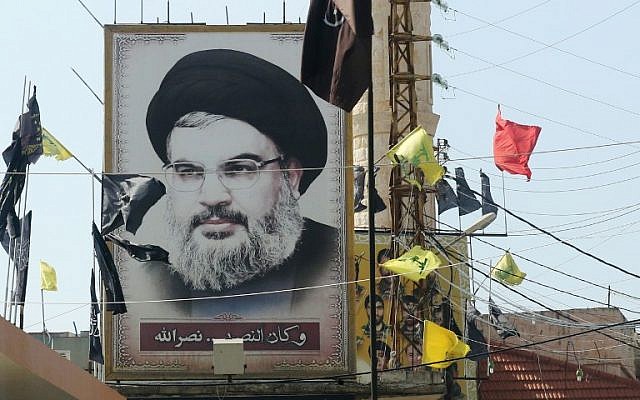Antonio Guterres says in report that allegations of arms transfers to Lebanese terror group continue ‘on regular basis’

UNITED NATIONS — Secretary-General Antonio Guterres warned in a new report that unauthorized weapons in the hands of Hezbollah and threatening rhetoric from the Lebanese militant group and Israeli officials “heightens risk of miscalculation and escalation into conflict.”
The UN chief called on Hezbollah and Israel, who fought a war in 2006, “to exercise restraint at all times” and “refrain from potentially inflammatory comments.”
Guterres said in the report to the UN Security Council circulated Friday that allegations of arms transfers to Hezbollah continue “on a regular basis,” which the UN takes seriously. But it “is not in a position to substantiate them independently,” he said.
Guterres noted, however, that Hezbollah has displayed the weapons and acknowledged using them.
The UN resolution that ended the 2006 war calls for Hezbollah and all other militias operating in Lebanon to be disarmed and demobilized. It also calls for the 10,700-strong UN peacekeeping force known as UNIFIL to monitor a zone south of the Litani River near Israel’s border where Hezbollah is banned from keeping weapons.
Guterres said Israel informed UNIFIL of the alleged presence of Hezbollah weapons and infrastructure in three specific locations in that zone, which the UN force closely monitored, including by aerial reconnaissance, satellite imagery and patrols.
But he said “no evidence to confirm the allegations was established.”
Guterres cited examples of heightened rhetoric between Hezbollah’s leaders and senior Israeli officials and said that despite “relative calm” along the UN-drawn Blue Line between Israel and Lebanon the level of tensions between the two countries remains high.
Rhetoric on both sides, he said, has “resulted in increased anxiety, including among the local population.”
Guterres said he was equally concerned about continued Israeli overflights of Lebanese territory.
From July 1 to October 30, he said UNIFIL recorded 758 air violations totaling 3,188 overflight hours, “an increase of 80 percent compared with the same period in 2016.” He said drones were involved in over 93% or 707 of the violations.
With over 1 million Syrian refugees in Lebanon, Guterres also said “anti-Syrian refugee sentiment is on the rise in the media and in the political discourse.”
He cited an increase in tensions between refugees and host communities, and “a marked increase” in protests over Syrians competing for jobs across Lebanon.
Guterres’ report was written before Lebanon’s Prime Minister Saad Hariri returned to Beirut.
The UN chief stressed the importance of parliamentary elections taking place as scheduled in May 2018.
As reported by The Times of Israel
